
 |
||||||
|
GAY
FILM REVIEWS BY MICHAEL D. KLEMM
|
||||||
|
Go Fish MGM
Home Video, Director:
Screenplay:
Starring:
Rated R, 83 mnutes |
The
Learned Ladies
Gay films got a make-over in the early 90s as what came to be known as the New Queer Cinema was born. The new crop of filmmakers pushed the envelope and made movies that challenged the very notions of what was once deemed acceptable on the lavender screen. Gay men and women were no longer victims; anger spilled onto the screen and the new directors no longer cared about such "quaint" notions as saintly role models. Tom Kalin's protagonists were Leopold and Loeb, Todd Haynes was channeling Genet and John Greyson made a musical about AIDS. I hadn't seen this much agitprop since Godard's heyday during the 60s. |
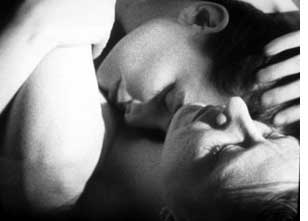 Something
else began to happen too. Queer films were no longer about being
gay; they just happened to be about characters who were gay.
A good example of this new phenomenon was Rose
Troche's 1994 film, Go Fish.
Here was a very personal film about a group of lesbians for whom coming
out issues was ancient history. Suddenly it was possible to make the very
films that Vito Russo longed for when writing The
Celluloid Closet - films that were simply about gay people living their
day to day lives. Go Fish was
one of these films and it is widely considered to be one of the milestones
of lesbian cinema. Something
else began to happen too. Queer films were no longer about being
gay; they just happened to be about characters who were gay.
A good example of this new phenomenon was Rose
Troche's 1994 film, Go Fish.
Here was a very personal film about a group of lesbians for whom coming
out issues was ancient history. Suddenly it was possible to make the very
films that Vito Russo longed for when writing The
Celluloid Closet - films that were simply about gay people living their
day to day lives. Go Fish was
one of these films and it is widely considered to be one of the milestones
of lesbian cinema. |
|
|
|
|
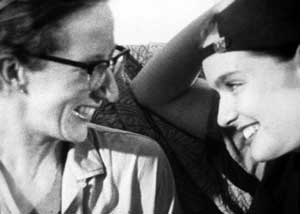 Ely
is older, wears dorky glasses and her long hair is stuck in the 60s. At
first, Max shows no interest in Ely at all. Max, who looks like a hip tomboy
and usually wears a backwards baseball cap, jokes about Ely's cupboard being
filled with infinite varieties of tea, all of it decaf. Ely also doesn't
seem interested. She has a long distance partner whom she hasn't seen in
two years and uses this as an excuse to avoid intimacy. Ely insists that
she is being faithful but her friends tell her that she isn't being monogamous
if she's not having sex. Ely
is older, wears dorky glasses and her long hair is stuck in the 60s. At
first, Max shows no interest in Ely at all. Max, who looks like a hip tomboy
and usually wears a backwards baseball cap, jokes about Ely's cupboard being
filled with infinite varieties of tea, all of it decaf. Ely also doesn't
seem interested. She has a long distance partner whom she hasn't seen in
two years and uses this as an excuse to avoid intimacy. Ely insists that
she is being faithful but her friends tell her that she isn't being monogamous
if she's not having sex. |
|
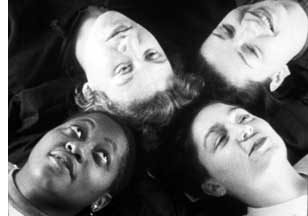 Drastic
measures are taken. Ely is talked into getting her hair cut to a more stylish
and butch jarhead crewcut and it succeeds in getting Max's attention. Now
it's just a matter of time. Eschewing all cliches, Max clips Ely's fingernails
and this turns into foreplay and finally fireworks between the two ladies.
Inbetween the scenes that develop their offbeat romance, Kia and her friends
- their heads filmed side by side and filling the screen - play matchmaker
and function as a Greek chorus. Drastic
measures are taken. Ely is talked into getting her hair cut to a more stylish
and butch jarhead crewcut and it succeeds in getting Max's attention. Now
it's just a matter of time. Eschewing all cliches, Max clips Ely's fingernails
and this turns into foreplay and finally fireworks between the two ladies.
Inbetween the scenes that develop their offbeat romance, Kia and her friends
- their heads filmed side by side and filling the screen - play matchmaker
and function as a Greek chorus. |
|
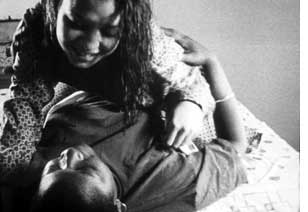 But
this isn't When Harry Met Sally, or even When MARY Met
Sally. The love story follows none of the usual formulas and it's broken
up by a number of discourses, both serious and comic, that address various
lesbian issues. Go Fish begins
with a classroom discussion in which Kia asks her students to add to a list
of women known, or believed to be, lesbians. The responses includes Sappho,
Lily Tomlin, Peppermint Patty, Endora from Bewitched, and the cast
of Roseanne. Kia's Latino girlfriend, Evy (Migdalia Melendez), is
outed to her old-world mother by her ex boyfriend. Ely's bed-hopping roommate,
Daria (Anastasia Sharp), sleeps with a man and faces a Kafka-esque trial
in which her hostile peers question her identity as a lesbian. A dream sequence
involves a wedding dress and satirical observations on societal expectations
of women. Max and Ely discuss the responsibility of queer filmmakers and
whether all gay characters they present on the screen really need to always
be positive ones. But
this isn't When Harry Met Sally, or even When MARY Met
Sally. The love story follows none of the usual formulas and it's broken
up by a number of discourses, both serious and comic, that address various
lesbian issues. Go Fish begins
with a classroom discussion in which Kia asks her students to add to a list
of women known, or believed to be, lesbians. The responses includes Sappho,
Lily Tomlin, Peppermint Patty, Endora from Bewitched, and the cast
of Roseanne. Kia's Latino girlfriend, Evy (Migdalia Melendez), is
outed to her old-world mother by her ex boyfriend. Ely's bed-hopping roommate,
Daria (Anastasia Sharp), sleeps with a man and faces a Kafka-esque trial
in which her hostile peers question her identity as a lesbian. A dream sequence
involves a wedding dress and satirical observations on societal expectations
of women. Max and Ely discuss the responsibility of queer filmmakers and
whether all gay characters they present on the screen really need to always
be positive ones. |
|
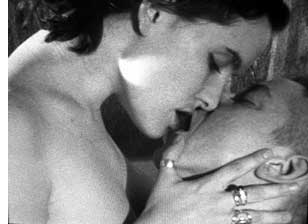 There
is a charm to this film that is infectious. There is nothing contrived about
the road that Max and Ely take from being awkward friends to passionate
lovers. It's rather touching to watch Ely transform from a wallflower into
a woman who is reconnecting with emotions she has kept repressed for too
long. The fact that her glasses still make her look geeky even after she
gets her new punk haircut is unimportant because of her newfound confidence.
This subtle realism allows the film to resonate with its audience. All of
the leads are superb. Kia functions as a wise den mother to this circle
of friends and Daria seems like an early forerunner of Shane on The
L Word. There
is a charm to this film that is infectious. There is nothing contrived about
the road that Max and Ely take from being awkward friends to passionate
lovers. It's rather touching to watch Ely transform from a wallflower into
a woman who is reconnecting with emotions she has kept repressed for too
long. The fact that her glasses still make her look geeky even after she
gets her new punk haircut is unimportant because of her newfound confidence.
This subtle realism allows the film to resonate with its audience. All of
the leads are superb. Kia functions as a wise den mother to this circle
of friends and Daria seems like an early forerunner of Shane on The
L Word. |
|
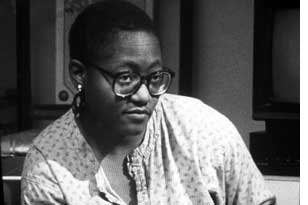 I
suppose that Director Troche's approach to this film can be summed up when
Kia asks "What would you rather our collective lesbian image be? Hot passionate
say yes to sex dykes or touchy feely soft focus sisters of the woodland?"
Say goodbye to Maxfield Parrish paintings and say hello to the 90s. A number
of the women in Go Fish wear
very short haircuts and their hybrid fashion statements are more butch than
femme. Max announces that she dresses the way that she does in order to
look "fashionable" and these women create their own gender identities. There
are a lot of close-ups of suspenders and legs wearing long shorts, not to
mention masculine names. Women of all types, and races, populate the cast
and all this adds to the film's honesty. I
suppose that Director Troche's approach to this film can be summed up when
Kia asks "What would you rather our collective lesbian image be? Hot passionate
say yes to sex dykes or touchy feely soft focus sisters of the woodland?"
Say goodbye to Maxfield Parrish paintings and say hello to the 90s. A number
of the women in Go Fish wear
very short haircuts and their hybrid fashion statements are more butch than
femme. Max announces that she dresses the way that she does in order to
look "fashionable" and these women create their own gender identities. There
are a lot of close-ups of suspenders and legs wearing long shorts, not to
mention masculine names. Women of all types, and races, populate the cast
and all this adds to the film's honesty. |
|
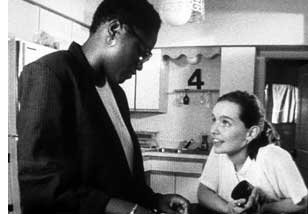 Go
Fish
is a true piece of guerrilla filmmaking. A low budget labor of love, Troche
spent three years making and editing her very personal movie. Filmed in
black & white and composed with frantic cutting and dream-like camera movements,
Go Fish is a punkish and artsy
film that still seems fresh more than a decade later. Sexy without being
prurient, Troche likes to be playfully suggestive and edgy - consider, for
example, the close-up image of a hand digging into a round bread and puling
it open during a cooking scene. Troche's next film,
Bedrooms & Hallways (1999), would examine straight and gay male
insecurity and, of course, she later went on to be a producer and frequent
director on The L Word
(in fact, she directed the pilot). Go
Fish
is a true piece of guerrilla filmmaking. A low budget labor of love, Troche
spent three years making and editing her very personal movie. Filmed in
black & white and composed with frantic cutting and dream-like camera movements,
Go Fish is a punkish and artsy
film that still seems fresh more than a decade later. Sexy without being
prurient, Troche likes to be playfully suggestive and edgy - consider, for
example, the close-up image of a hand digging into a round bread and puling
it open during a cooking scene. Troche's next film,
Bedrooms & Hallways (1999), would examine straight and gay male
insecurity and, of course, she later went on to be a producer and frequent
director on The L Word
(in fact, she directed the pilot). |
|
|
One last thought, after all you have just read... Why did someone in MGM's art department make the DVD box of Go Fish look like a publicity still from Valley Of The Dolls?
More
On Rose Troche: Guinevere Turner
also appears in: |